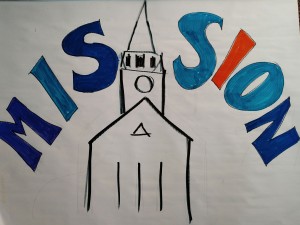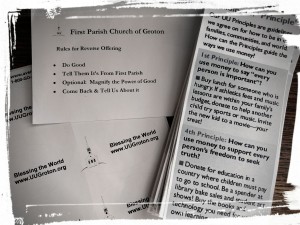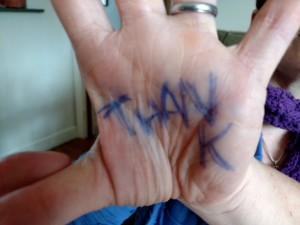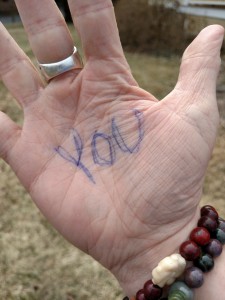First Parish Church of Groton
(click here for the audio version)
I’ve got a favor to ask. It’s not easy. In fact, it’s uncomfortable. Which is supposedly a good thing because that is our worship theme for the month: “The Practice of Being Uncomfortable.”
I’m going to ask us to talk about money.
It is Renewal of Giving season. This was a new phrase to me – one I hadn’t heard it before coming to First Parish. “Canvas,” “stewardship,” “pledging” – those were familiar. Maybe you’ve heard those terms, too.
In the end, (and the beginning and the middle), no matter the word we use, we are still talking about money.
And there are other notions lurking when we talk about, or around, money:
Fairness.
Responsibility.
Security.
Shame.
Invisibility.
Privacy.
Worry.
Comfort.
Access.
Judgment.
Fear of Judgment.
Scarcity.
Abundance.
I have heard from people that they do not come to church during pledge season. I have heard from others that it is not easy to come here, listening to the plea for increased generosity, knowing that they are already stretching as far as they can. They are brave to show up. From still others, I have heard that church is not the place to talk about money. It is somehow not spiritual. So when we talk about it, damn right it’s uncomfortable.
As wise teachers have told us over and over again, the spiritual life is not one of comfort.
Knowing this, honoring this, I want to invite us to tenderly, fiercely, and authentically, step through all that muck and into this year’s season of Renewal of Giving with our hearts focused on First Parish and all that it can be.
I have spent a lot of time reflecting on this. It strikes me there are three ways to approach Renewal of Giving.
First off, we can look pragmatically: It takes money to make a church run – always has, always will. Before the separation of church and State, it was taxes that paid for church. Even if you didn’t go to church, you paid to support it. Pretty imperfect system. Then, when churches lost access to taxes, churches in New England – including First Parish — sold the right to pews. Often in perpetuity. This offends our modern sensibilities about fairness and equal access, but that deeply imperfect system is what paid for church. Now, we have a system of fundraising throughout the year and pledging annually. It is also an imperfect system but less imperfect than the ones that came before; of that there is no doubt. And yet, it is the one we have. And now it’s time to step up.
 Secondly, we can look missionally: Do you know the pop song from a few years back called “Price Tag?” I am not going to ask for hands because I think there would be few and far between, given that we have already sung the children and youth to RE. The singer (Jesse J, if you must know) sings, “It’s not about the money, money, money / We don’t need your money, money, money / We just want to make the world dance/forget about the price tag.” When I am alone in my car, I blast that song. I blasted on the way here this morning and it’s quite likely that I will do so again today when I drive out of here to beat the snow home. I have even considered having it in worship. The message that I hear in these lyrics? It’s a paradox. Let’s do the mission of First Parish – maybe it’s making the world dance, but usually we call it blessing the world – and fund it, whatever it takes. Lead with mission and find the way. It’s a legitimate way to do church, but it is also one that makes many fiscally conservative church leaders cringe, even sometimes it makes me cringe. And now it’s time to step up.
Secondly, we can look missionally: Do you know the pop song from a few years back called “Price Tag?” I am not going to ask for hands because I think there would be few and far between, given that we have already sung the children and youth to RE. The singer (Jesse J, if you must know) sings, “It’s not about the money, money, money / We don’t need your money, money, money / We just want to make the world dance/forget about the price tag.” When I am alone in my car, I blast that song. I blasted on the way here this morning and it’s quite likely that I will do so again today when I drive out of here to beat the snow home. I have even considered having it in worship. The message that I hear in these lyrics? It’s a paradox. Let’s do the mission of First Parish – maybe it’s making the world dance, but usually we call it blessing the world – and fund it, whatever it takes. Lead with mission and find the way. It’s a legitimate way to do church, but it is also one that makes many fiscally conservative church leaders cringe, even sometimes it makes me cringe. And now it’s time to step up.
Thirdly, we can look spiritually: Engaging in acts of generosity (of all sorts, not just financial) is a spiritual practice. When we practice generosity towards others, we find a deep generosity within ourselves that enriches. It is also one of the ways that First Parish identifies itself: we call ourselves a “school for compassion, gratitude and generosity.” Generosity takes many forms. When we commit to sustain this congregation for ourselves and for the world, when we commit to receive and to give, then we commit to sustain this place with our money. And now it’s time to step up.
~~~
Elder ministerial colleagues love to tell stories of when they were new ministers, wobbly on their clergy feet not unlike newborn deer. As a newbie myself, my feet just beginning to find solid ground, I like listening to them. [Some of them.] One story I read recently included advice from the president of a congregation that minister was serving:
“Give not until it hurts but until it helps.” [AJ Priest, quoted in Sweetser]
The president’s sage advice continued, stating “that people need liberating by generosity, [and] so too do congregations.” Referring to his church’s tradition of sharing the plate with a community partner for a good cause on a monthly basis (very much like what First Parish does) he pointed out, that this was “giving until it helped, but it was also freeing the institution from a sense of scarcity.” [Terry Sweetser, The Abundance of our Faith]
That is the whole brilliance behind the Reverse Offering this year. Freeing ourselves from a sense of scarcity.
~~~
In last year’s sermon on Commitment Sunday, Elea preached on how we spend our days is how we spend our lives. Ralph Waldo Emerson, once Unitarian minister and wholly Transcendentalist, and perhaps nearly as wise as Elea (but much less likeable), said something similar:
“A person will worship something, have no doubt about that. We may think our tribute is paid in secret in the dark recesses of our hearts, but it will come out. That which dominates our imaginations and our thoughts will determine our lives, and our character. Therefore, it behooves us to be careful what we worship, for what we are worshipping, we are becoming.”
~~~
This year, as part of my responsibilities, I have been a part of the meetings of your newly-structured Joint Board as they steward First Parish in its day-to-day operations, as well as envisioning its future. It has been an utter gift, which has filled me with admiration for these people and the enormous amounts of time they voluntarily give to ensure this church continues its existence. It’s stunning, actually, and I walk away from those meetings in awe of their aims and with respect for each and every one of them, even if we do not always see eye to eye.
And because it is my temperament, and because maybe, theoretically, it is somewhere on the job description for a minister, I worry about them and I wonder about them. I worry about them because they work so hard, because they want so much for good things to happen to this church, and sometimes it doesn’t work out as hoped. I worry about them because there is a continual need for new folks with the right set of gifts to step forward into leadership roles, to fill committees and say yes to tasks, but that doesn’t always happen.
I wonder about them because during my interactions in my nearly two years here, I have observed a strong sense of scarcity, particularly around money and budgets. It is a scarcity that the numbers do not always bear out.
I worry and I wonder. I wonder where that sense of scarcity comes from – especially because the three congregations with which I have intimate familiarity do not have access to the kind of the resources that First Parish does. And I wonder what the history is – how long has this sense of scarcity been around? Five years? A decade? A century? From its very inception? I don’t know the answer.
I worry that if too much energy feeds that sense of scarcity, that it will become more reality than it really is, that it will calcify and become the story we tell ourselves, that it will become what dominates our imaginations and determine our character, to borrow Emerson’s phrase.
So this is why, this year, it was a bold move on the board’s part to decide to give away money. It was daring to face worries about the church budget balancing and still choose to prioritize blessing in the wider world. I might even call it audacious to choose, as an intentional response to the scarcity, to give away money through the Reverse Offering: $5 and $10 bills that each person – adult, youth or child – who was here on February 28 – received in order to go out and Do Good in the world, and if possible, to Magnify it.
 Right now, I want to invite you to come up to the mic to briefly share your story of Doing Good. I think it’s important that we all hear these stories. If nobody steps up, I’ll tell some of them, because they are so worth hearing, so worth amplifying, so worth knowing.
Right now, I want to invite you to come up to the mic to briefly share your story of Doing Good. I think it’s important that we all hear these stories. If nobody steps up, I’ll tell some of them, because they are so worth hearing, so worth amplifying, so worth knowing.
While you all are making your way forward, I’ll say that we won’t be able to share all of them. I want to figure out a way to collect them in one place so that it becomes part of the story you tell about yourselves. I don’t know if any of you saw the video I posted, made by Live Oak Unitarian Universalist in Cedar Park, Texas, informing the world of what they did with their Reverse Offering. If someone here has the mad skills to do something like that, please let me know!
[Stories]
Thank you for sharing your stories so that it would become part of the woven tapestry of First Parish life.
~~~
Paradox is at the heart of Jesus’ teachings:
- The last shall be first and the first shall be last.
- The meek shall inherit the earth.
- To live, first one must die.
- To have that which is most valuable, you must give away that which you treasure.
It is not only Christianity that finds spiritual energy in paradox. Here is a quote from Zen Master Katagiri-Roshi: If you want spiritual security, let go of everything.
I will be the first to say that I have in my possession, not just among all my worldly possessions, but just in the bag I brought into church with me today, just among the scattered stuff that has taken up residence inside my bumper-sticker-laden car, I have things that I could, and probably should, give away. I have things that if Jesus were to talk to me, he’d be all Marvin Gaye on me, “Got to give it up.” If Zen Master Roshi were to look at the accumulation of things in my life, he would say, “Girl, you got to let that go.”
In all seriousness, I have learned much from being a part of the Renewal of Givin g process. This includes that when I pledged to my home congregation just a few weeks ago, I came to realize that I needed to let go of some more of my own money. Even with this increase, it is not at the level I aspire to. I hope, that if it turns out that I have a job next fall, that I will be able to increase it.
g process. This includes that when I pledged to my home congregation just a few weeks ago, I came to realize that I needed to let go of some more of my own money. Even with this increase, it is not at the level I aspire to. I hope, that if it turns out that I have a job next fall, that I will be able to increase it.
Here at First Parish, and I think for anyone who is human, we must choose over and over again to worship acts of generosity. It does not come easily, given our materialistic culture. We must choose over and over again to nurture a sense of abundance and blessing the world, rather than the pernicious sense of scarcity that misleads, misinforms, and misshapes our hearts and characters.
With the Reverse Offering, we showed we had the pluck to do it. Instead of clinging to every last penny to ensure the budget was balanced, we placed as first our mission to be a blessing to the world by Doing Good and Magnifying It. We faced scarcity and responded with generosity – utterly paradoxical and hopefully, transformational.
And here’s our last paradox of the day: I’m not talking about transforming the world with our $5 or $10, even if some of our efforts were magnified (and magnified in such creative ways!), even if it made someone’s day, even if it restored some folks’ faith in humanity (which, I am sure some of these acts did). I’m talking about transformation of our own hearts, our own mindsets. For as much as an act of generosity or kindness benefits the recipient, the more lasting effect is often on the person or people gave or acted kindly or generously.
One last thing: Pragmatically, missionally, spiritually: while there are many good and worthy places to give your hard-earned money, I want to gently and tenderly offer this reminder: you are the only ones who are going to give to First Parish. No one who doesn’t go to this church is going to say, “Oh, that church that I don’t go to: I think I’m going to give them a cool three thou’ just for the heck of it.”
So tenderly, fiercely, authentically I say this to you with love and admiration in my heart: it’s up to you. It’s your responsibility and no one else’s. And it’s time to step up.
Whether today is your first visit, or you have been coming here your whole life, you are a part of a 360-plus year heritage of people who have worshipped in this Old Meeting House and who have said yes, we commit to make this a place that remember what matters most and raises up that which is worthy.
You are a people who, when given a small amount of money and the mandate to Do Good, you find such creative, humorous, compassionate ways to magnify the blessings of this church. You have made my heart, and the heart of others, sing.
Let us be a people who takes to heart what the poet Anne Sexton told us in today’s reading (“Welcome Morning“):
So while I think of it,
let me paint a thank-you on my palm
for this God, this laughter of the morning,
lest it go unspoken.
The Joy that isn’t shared, I’ve heard,
dies young.
Let us be a people who does not let joy die young.
Let us declare we are people who say, “Yes: We will give. Not til it hurts, but til it helps.”
May it be so. Amen. Blessed be.


A pitch perfect approach to this uncomfortable topic. Thank you.
Thank you.